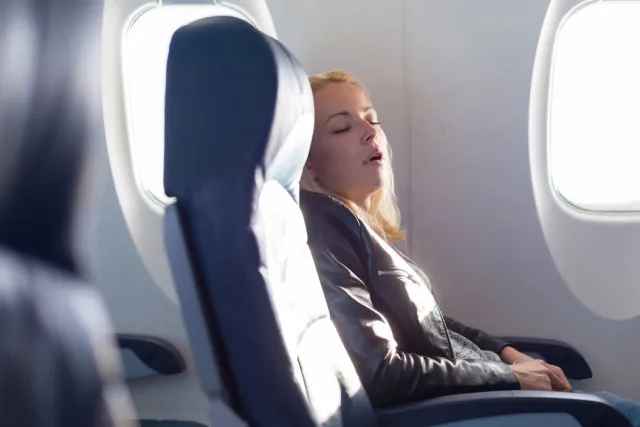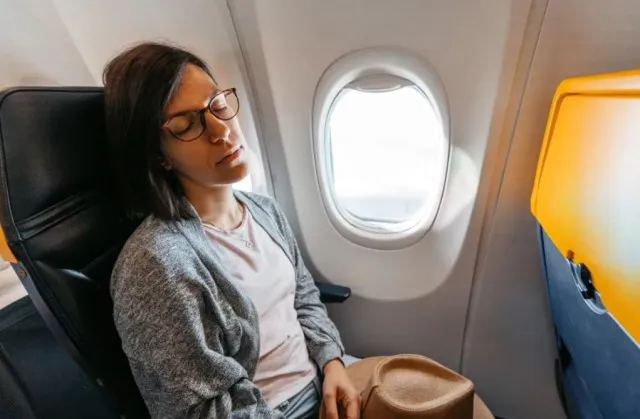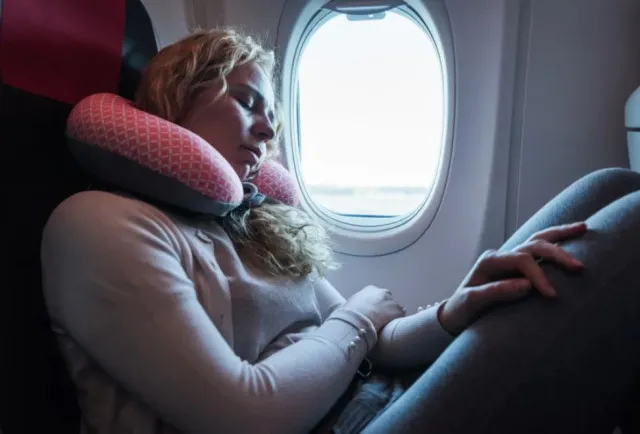On social media, many viewers stunned after a viral showed the expert explains why you should never sleep during takeoff and landing on a flight.
As Christmas approaches, many are preparing for holiday travel.
However, aviation experts warn against a common mistake: sleeping during takeoff and landing. Staying awake during these crucial moments can significantly impact your health and safety. Here are two key reasons why you should remain alert.
The importance of staying awake during takeoff and landing
In a TikTok video, flight attendant Ale Pedroza shared important travel tips. She explained why passengers should avoid sleeping during takeoff.

Pedroza acknowledged the exhaustion that often comes with traveling, stating, “I know traveling can be exhausting, and sometimes you just wanna get on an airplane and go straight to sleep.”
However, she emphasized that sleeping before takeoff can negatively affect your ears and noted that the taxiing phase is crucial for flight safety.
She advised staying awake and alert during takeoff in case of emergencies or the need to evacuate.
Although Pedroza didn’t elaborate on ear safety, the Mayo Clinic supports her warning about “airplane ear,” or ear barotrauma. This condition occurs when there is an imbalance in air pressure between the middle ear and the environment, leading to stress on the eardrum.
The video quickly went viral and sparked debate on social media

In the comment section, many viewers expressed their shock at Ale Pedroza’s revelation. However, others defended their choice to sleep during takeoff and landing.
One person said: I be out like a light before the doors close.
A second wrote: I am soooooo jealous of people who can sleep on planes. What a dream.
While a third commented: Someone tag the guy doing yoga BAREFOOT in the middle of the aisle.
Another added: The white noise from the plane knocks me out before take off. everytime!
@wonderfullyale What not to do on an airplane ✈️ #flightattendant #traveltips #flightattendanttips #traveldonts
The risk of ear barotrauma

Dozing off during a flight may seem appealing, but it poses serious health risks. One major concern is ear barotrauma, commonly known as “airplane ear.” This condition occurs due to pressure differences between the inside and outside of the ear.
Symptoms of ear barotrauma
When you sleep, your eardrums struggle to cope with rapid air pressure changes during takeoff and landing. This can lead to painful symptoms, including:
– Pain in the ear
– A sensation of stuffiness
– Slight hearing loss
– Muffled hearing
Why you should stay awake matters
Professor Dan Bubb from the University of Nevada explains, “When we are asleep, we don’t swallow as much to equalize the pressure in our ears.” Most healthy adults can alleviate pressure by yawning, swallowing, or chewing.

However, children and infants may find this challenging due to their smaller Eustachian tubes.
The need for awareness during emergencies
Staying alert for safety
The second reason to avoid sleeping is to remain aware of your surroundings. In an emergency, it is crucial to be fully conscious and ready to react. Bubb emphasizes that being awake allows you to respond quickly if passengers and crew need to evacuate the airplane.
The increased risk during takeoff and landing

Reports from Boeing and Airbus indicate that accidents are statistically more likely during takeoff and landing. Sleeping through these critical moments could delay your reaction time, putting you at greater risk.
In conclusion, it is essential to stay awake during takeoff and landing to reduce the risk of ear barotrauma and ensure your safety. Instead of catching up on sleep during the flight, save it for when you arrive at your holiday destination. Prioritizing alertness can help you enjoy a safer and more pleasant journey.